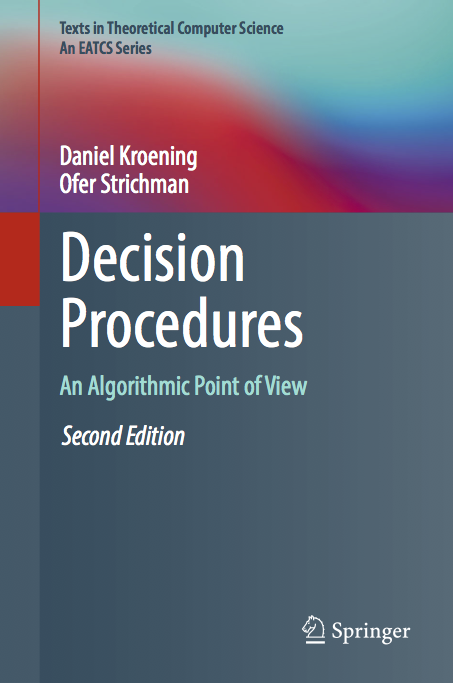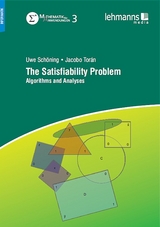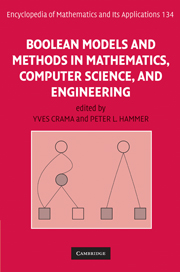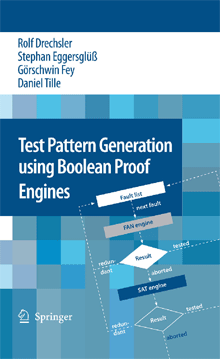SAT Live!
keep up to date with research on the satisfiability problem
Recent news about SAT subscribe via RSS
-
Sep 18, 2017 IJCAR'18 Call for papers by Valentin Montmirail CFP Deadline
The 9th International Joint Conference on Automated Reasoning, IJCAR 2018 Oxford, UK, July 14-17, 2018. -
Sep 1, 2017 Postdoc position in SAT solving at KTH Royal Institute of Technology by Jakob Nordström Position Deadline
The Theory Group at KTH Royal Institute of Technology is looking for a postdoc in SAT solving.
-
Jul 11, 2017 Special Issue on Algorithm Selection and Configuration in Evolutionary Computation, Evolutionary Computation Journal, MIT Press by Holger H. Hoos CFP Deadline
The goal of this special issue is to provide an account of recent advances in research on algorithm selection and configuration, with a focus on evolutionary computation and related meta-heuristic techniques. -
Jun 20, 2017 CFP ICTAI'17 Special track on SAT and CSP by Jean-Marie Lagniez Deadline CFP
Submission deadline is June 25. -
May 5, 2017 Call for Workshops at the 2018 Federated Logic Conference (FLoC 2018) by Martina Seidl CFP Deadline
The SAT'18 conference invites proposals for workshops affiliated with SAT at FLoC 2018 in Oxford, England, 6-19 July 2018. -
Apr 24, 2017 Final CFP - SAT 2017 - August 28 - September 1, 2017 - Melbourne, Australia by Daniel Le Berre CFP Deadline
Final call for papers. The next SAT conference will take place in Melbourne, right after IJCAI, together with CP and ICLP. -
Apr 5, 2017 CP'17 call for papers by Yael Ben-Haim CFP Deadline
This year, CP will be co-located with SAT and ICLP. Moreover, CP will hold a thematic track on SAT & CP. -
Apr 3, 2017 JAR Special Issue on Automated Reasoning Systems by Armin Biere CFP Deadline
The past few decades have seen major developments and practical achievements in automated reasoning systems: that special issue is dedicated to those systems in their full variety. -
Mar 1, 2017 Postdoc and PhD positions in SAT solving at KTH Royal Institute of Technology by Jakob Nordström Position Deadline
The Theory Group at KTH Royal Institute of Technology is looking for postdocs and PhD students in SAT solving.
-
Feb 25, 2017 SAT'17 call for workshop by Stefan Ruemmele CFP Deadline
The SAT'17 conference invite proposals for workshops associated to the main conference program of SAT 2017, which will be held in Melbourne (Australia) from August 28 to September 1, 2017, colocated with CP 2017 and ICLP 2017, and following IJCAI 2017 -
Feb 24, 2017 TABLEAUX 2017: 26th International Conference on Automated Reasoning with Analytic Tableaux and Related Methods by Valentin Montmirail CFP Deadline
TABLEAUX is the main international conference at which research on all aspects, theoretical foundations, implementation techniques, systems development and applications, of the mechanization of tableaux-based reasoning and related methods is presented -
Feb 8, 2017 ARCADE: Automated Reasoning: Challenges, Applications, Directions, Exemplary Achievements CFP by Dmitriy Traytel CFP Deadline
The main goal of this workshop is to bring together key people from various sub-communities of automated reasoning—such as SAT/SMT, resolution, tableaux, theory-specific calculi (e.g. for description logic, arithmetic, set theory), interactive theorem proving—to discuss the present, past, and future of the field. -
Jan 7, 2017 Associate professorship in computer science (including SAT solving) at KTH Royal Institute of Technology by Jakob Nordström Position Deadline
The School of Computer Science and Communication at KTH Royal Institute of Technology invites applications for a tenured associate professorship in computer science with a broad profile, covering all research areas currently represented at the school (thus including SAT solving).
-
Dec 20, 2016 PhD and Postdoc positions in SAT solving at KTH Royal Institute of Technology by Jakob Nordström PhD PostDoc Position Deadline
The Theory Group at KTH Royal Institute of Technology is looking for one postdoc and one PhD student in SAT solving.
-
Dec 20, 2016 First CFP - SAT 2017 - August 28 - September 1, 2017 - Melbourne, Australia by Daniel Le Berre CFP
The next SAT conference will take place in Melbourne, right after IJCAI, together with CP and ICLP. -
Dec 19, 2016 QBFEVAL 2017 - Preliminary Call For Benchmarks by QBF Deadline
QBFEVAL'17 will be the 2017 competitive evaluation of QBF solvers, and the twelfth evaluation of QBF solvers and instances ever. QBFEVAL'17 will award solvers that stand out as being particularly effective on specific categories of QBF instances. -
Jun 27, 2016 CFP 9th Workshop on Answer Set Programming and Other Computing Paradigms by Amelia Harrison CFP Deadline ASP
Submission deadline extended to July 4 -
Jun 6, 2016 HBench - A new GUI-based platform on Windows for performance benchmarking by Ofer Strichman Tools
HBench provides a simple one-form GUI for managing performance-oriented research of algorithms. It runs your engine over a set of benchmarks with multiple parameter sets, collects statistics into a csv file, prepares scatter/cactus plots, lets the user control the active cores, and much more. It supports both remote execution on a linux cluster and running on a local windows machine. It makes the whole benchmarking process much easier. -
May 5, 2016 SAT/SMT/AR summer school, Lisbon, Portugal by Ines Lynce CFP SAT SMT Deadline
EXTENDED APPLICATION DEADLINE: May 15th, 2016 -
Apr 29, 2016 International Workshop on Graph Structure and Satisfiability Testing by Stefan Mengel CFP Deadline
Deadline extended to May 18.
Our annual conference
Upcoming deadlines
- March 27, 2025
- SAT'25 paper submission
- May 12, 2025
- PoS'25 paper submission










